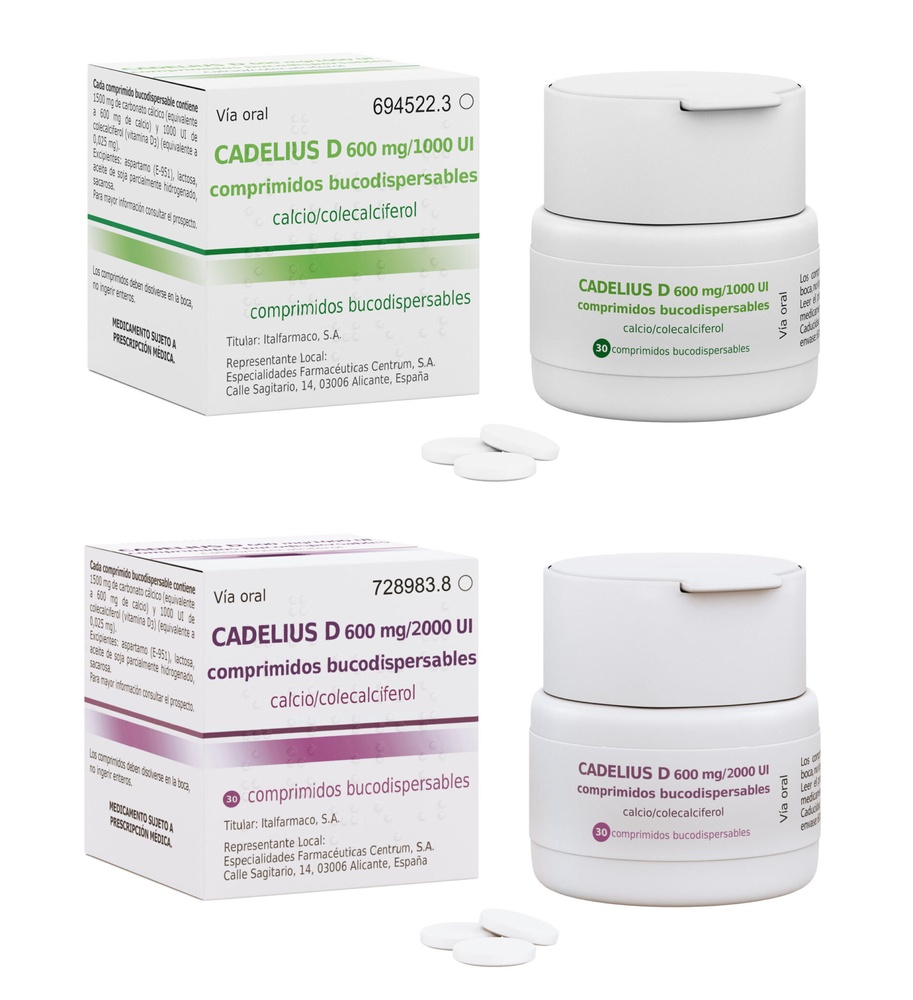
CADELIUS D 600 MG/1000 IU ORALLY DISINTEGRATING TABLETS


How to use CADELIUS D 600 MG/1000 IU ORALLY DISINTEGRATING TABLETS
Translated with AI
This page provides general information and does not replace a doctor’s consultation. Always consult a doctor before taking any medication. Seek urgent medical care if symptoms are severe.
Show originalContents of the leaflet
Introduction
Package Leaflet: Information for the User
Cadelius D 600 mg/1,000 UI Oral Dispersible Tablets
Calcium carbonate/colecalciferol
Read all of this leaflet carefully before you start taking this medicine because it contains important information for you.
- Keep this leaflet, you may need to read it again.
- If you have any further questions, ask your doctor, pharmacist, or nurse.
- This medicine has been prescribed for you only. Do not pass it on to others. It may harm them, even if their signs of illness are the same as yours.
- If you get any side effects, talk to your doctor, pharmacist, or nurse. This includes any possible side effects not listed in this leaflet. See section 4.
Contents of the pack
- What Cadelius D is and what it is used for
- What you need to know before you take Cadelius D
- How to take Cadelius D
- Possible side effects
- Storing Cadelius D
- Contents of the pack and other information
1. What Cadelius D is and what it is used for
Cadelius D is used to prevent and treat calcium or vitamin D3 deficiency in elderly people and as additional treatment in osteoporosis in patients at risk of vitamin D or calcium deficiency when a dietary supplement of 600 mg/day of calcium and 1,000 IU/day of vitamin D3 is appropriate.
Cadelius D contains calcium and vitamin D3, both important components in bone formation. Vitamin D3 regulates the absorption and metabolism of calcium as well as the incorporation of calcium into bone tissue.
Ask your doctor or pharmacist if you have any questions and always follow their instructions.
You should consult a doctor if it worsens or does not improve after a few days.
2. What you need to know before you take Cadelius D
Do not take Cadelius D
- If you are allergic to calcium, vitamin D, or any of the other ingredients of this medicine (listed in section 6).
- If you have hypercalcemia (high levels of calcium in the blood) or hypercalciuria (high levels of calcium in the urine).
- If you have hypervitaminosis D (high levels of vitamin D in the blood).
- If you have kidney stones.
- If you have kidney failure.
- If you are allergic to soy or peanuts.
Warnings and precautions
Consult your doctor or pharmacist before taking Cadelius D
- if you have sarcoidosis (a special type of connective tissue disease that affects the lungs, skin, and joints).
- if you are taking other medicines that contain vitamin D or calcium.
- if your kidneys do not work well or you have a tendency to form kidney stones.
- if you are immobilized due to osteoporosis.
Other medicines and Cadelius D
Tell your doctor or pharmacist if you are taking, have recently taken, or might take any other medicines.
The effect of treatment may be affected if this medicine is taken at the same time as other medicines for:
- high blood pressure (thiazide diuretics)
- heart problems (cardiac glycosides such as digoxin)
- high cholesterol (cholestyramine)
- constipation (laxatives such as liquid paraffin)
- epilepsy (phenytoin or barbiturates)
- inflammatory diseases/immunosuppression (corticosteroids)
- obesity (orlistat).
Please make sure your doctor knows if you are taking any of the medicines listed above. Your dose may need to be adjusted.
If you take at the same time a medicine for
- osteoporosis (bisphosphonates)
you should take it at least one hour before taking Cadelius D.
If you are taking at the same time medicines for
- infections (quinolones)
you should take them two hours before or six hours after taking Cadelius D.
If you take at the same time medicines for
- infections (tetracyclines)
you should take them two hours before or six hours after taking Cadelius D.
If you take at the same time medicines for
- dental caries (sodium fluoride)
- anemia (iron)
you should take these medicines at least three hours before taking Cadelius D.
If you take at the same time medicines for
- hypothyroidism (levothyroxine)
you should take Cadelius D at least four hours apart.
Taking Cadelius D with food, drinks, and alcohol
The absorption of calcium may be inhibited by foods containing oxalic acid (present in spinach and rhubarb) or phytic acid (present in whole grains). You should wait at least two hours before taking Cadelius D if you have taken foods with high oxalic acid or phytic acid content.
Pregnancy, breastfeeding, and fertility
During pregnancy, the daily intake should not exceed 1,500 mg of calcium and 600 IU of vitamin D. Therefore, it is not recommended to take Cadelius D during pregnancy.
Cadelius D can be taken during breastfeeding. Calcium and vitamin D3 pass into breast milk. This should be taken into account when vitamin D is additionally administered to the infant.
If you are pregnant or breastfeeding, think you may be pregnant, or are planning to have a baby, ask your doctor for advice before taking this medicine.
Driving and using machines
No effects on the ability to drive and use machines have been observed.
Cadelius D contains aspartame
This medicine contains 8.67 mg of aspartame in each tablet. Aspartame is a source of phenylalanine that may be harmful in people with phenylketonuria (PKU), a rare genetic disorder in which phenylalanine accumulates because the body cannot eliminate it properly.
Cadelius D contains lactose and sucrose.
If your doctor has told you that you have an intolerance to some sugars, consult them before taking this medicine. It may damage teeth.
3. How to take Cadelius D
Follow exactly the administration instructions of this medicine given by your doctor or pharmacist. If you are in doubt, consult your doctor or pharmacist again.
The dose is established by your doctor individually.
The recommended dose is 1 tablet per day.
The tablets should be dissolved in the mouth. They should not be swallowed whole.
The tablets should be taken preferably after meals.
The amount of calcium in Cadelius D is less than the daily intake usually recommended. Cadelius D is therefore recommended in patients who need an additional intake of vitamin D, but with a daily intake of 500-1,000 mg of calcium per day. The dose of calcium recommended for you should be established by your doctor.
Use in children and adolescents
Cadelius D is not indicated in children and adolescents.
If you take more Cadelius D than you should
If you have taken more Cadelius D than you should, consult your doctor or pharmacist immediately or call the Toxicology Information Service, phone 91 562 04 20, indicating the medicine and the amount taken.
The symptoms of an overdose of Cadelius D may include loss of appetite, thirst, abnormal emission of large amounts of urine, nausea, vomiting, and constipation.
If you forget to take Cadelius D
Take it as soon as you remember. Then take the next dose as usual. However, if it is already time for your next dose, skip the missed dose and continue as usual. Do not take a double dose to make up for the missed doses.
If you have any further questions on the use of this medicine, ask your doctor or pharmacist.
4. Possible side effects
Like all medicines, this medicine can cause side effects, although not everybody gets them.
You must stop taking Cadelius D and inform your doctor immediately if you experience symptoms of severe allergic reactions such as:
- Swelling of the face, lips, tongue, or throat
- Difficulty swallowing
- Hives and difficulty breathing
Uncommon side effects (may affect up to 1 in 100 people):hypercalcemia (elevated calcium levels in serum) and/or hypercalciuria (elevated calcium levels in urine).
Rare side effects (may affect up to 1 in 1,000 people):constipation, flatulence, nausea, abdominal pain, diarrhea, pruritus, rash, and urticaria.
Side effects with unknown frequency (frequency cannot be estimated from the available data):severe allergic reactions.
Other special populations
Patient with renal insufficiency could have a potential risk of hyperphosphatemia, nephrolithiasis, and nephrocalcinosis
Reporting of side effects
If you experience any side effects, talk to your doctor, pharmacist, or nurse. This includes any possible side effects not listed in this leaflet. You can also report side effects directly through the Spanish Pharmacovigilance System for Human Use Medicines: https://www.notificaram.es. By reporting side effects, you can help provide more information on the safety of this medicine.
5. Storing Cadelius D
Keep this medicine out of the sight and reach of children.
Keep the container tightly closed.
Do not use this medicine after the expiry date which is stated on the container after EXP. The expiry date is the last day of the month shown.
Store in the original package to protect from light. Keep the container tightly closed to protect from moisture.
The shelf life after first opening is 60 days.
Do not use this medicine if you notice any visible signs of deterioration.
Medicines should not be disposed of via wastewater or household waste. Ask your pharmacist how to dispose of medicines no longer required. These measures will help protect the environment.
6. Contents of the pack and other information
Composition of Cadelius D
- The active substances are calcium carbonate and colecalciferol (vitamin D3). Each tablet contains 1,500 mg of calcium carbonate equivalent to 600 mg of calcium and 1,000 IU of colecalciferol equivalent to 0.025 mg.
- The other ingredients are: maltodextrin, aspartame (E951), low-substituted hydroxypropylcellulose (E463), lactose monohydrate, anhydrous citric acid (E330), orange flavor, stearic acid, all-rac-α-tocopherol (E307), partially hydrogenated soybean oil, gelatin, sucrose, corn starch, silicon dioxide.
Appearance and packaging
Cadelius D is presented in the form of white or almost white, circular, beveled oral dispersible tablets.
Bottles of 30 or 60 tablets.
Not all pack sizes may be marketed.
Marketing authorization holder
ITALFARMACO, S.A.
C/ San Rafael, 3
28108 Alcobendas, Madrid
Spain
Manufacturer
ITALFARMACO, S.p.A.
Viale Fulvio Testi 330
20126 Milan
Italy
You can obtain further information on this medicine by contacting the local representative of the marketing authorization holder
Especialidades Farmacéuticas Centrum, S.A.
C/ Sagitario 14
03006 Alicante
Spain
This medicine is authorized in the Member States of the European Economic Area under the following names
Spain Cadelius D 600 mg/1,000 UI oral dispersible tablets
France Cadelius 600 mg/1,000 UI orodispersible tablets
Italy Riliscal 600 mg/1,000 UI orodispersible tablets
Portugal Riliscal 600 mg + 1,000 UI orodispersible tablets
Greece Cadelius 600 mg + 1,000 IU oral dispersible tablets
Date of last revision of this leaflet:January 2022
Updated information on this medicine is available on the website of the Spanish Agency for Medicines and Health Products (AEMPS) (http://www.aemps.gob.es).
- Country of registration
- Average pharmacy price9.01 EUR
- Prescription requiredYes
- Manufacturer
- This information is for reference only and does not constitute medical advice. Always consult a doctor before taking any medication. Oladoctor is not responsible for medical decisions based on this content.
- Alternatives to CADELIUS D 600 MG/1000 IU ORALLY DISINTEGRATING TABLETSDosage form: CHEWABLE TABLET, 1000 mg/880 IUActive substance: Calcium, combinations with vitamin D and/or other drugsManufacturer: Lacer S.A.Prescription requiredDosage form: ORALLY DISINTEGRATING TABLET/LIOTAB, 1500 mg calcium carbonate; 400 IU cholecalciferolActive substance: Calcium, combinations with vitamin D and/or other drugsManufacturer: Itf Medilab Farma S.A.Prescription requiredDosage form: ORALLY DISINTEGRATING TABLET/LYOTAB, 1500 mg calcium carbonate (600 mg Calcium) + 2000 IU cholecalciferolActive substance: Calcium, combinations with vitamin D and/or other drugsManufacturer: Italfarmaco S.A.Prescription required
Online doctors for CADELIUS D 600 MG/1000 IU ORALLY DISINTEGRATING TABLETS
Discuss questions about CADELIUS D 600 MG/1000 IU ORALLY DISINTEGRATING TABLETS, including use, safety considerations and prescription review, subject to medical assessment and local regulations.
Frequently Asked Questions















